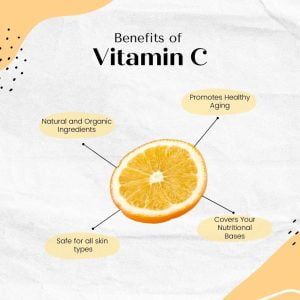
Vitamin C is an essential nutrient that plays a vital role in many bodily functions. It is a powerful antioxidant that can help protect your cells from damage. Vitamin C is also important for immune function, energy production, and wound healing.
In this blog post, we will discuss the role of vitamin C in immunity, energy, and weight management. We will also discuss how much vitamin C you need and how to get enough vitamin C from your diet.
What is vitamin C?
Vitamin C is a water-soluble vitamin that is essential for human health. It is also known as ascorbic acid. Vitamin C is not produced by the body, so it must be obtained from food or supplements.
Why is vitamin C important?
Vitamin C is important for many bodily functions, including:

Benefits of vitamin c
How does vitamin C work?
Vitamin C works as an antioxidant. Antioxidants help to protect cells from damage caused by free radicals. Free radicals are unstable molecules that can damage cells, leading to a number of health problems. Vitamin C is also involved in the production of collagen, which is a protein that gives skin its strength and elasticity.
In this introduction, we have discussed the importance of vitamin C and how it works. In the following sections, we will discuss the role of vitamin C in immunity, energy, and weight management. We will also discuss how much vitamin C you need and how to get enough vitamin C from your diet.
Vitamin C is a powerful antioxidant that can help protect your cells from damage. It is also essential for the production of white blood cells, which help fight infection.
How does vitamin C boost immunity?
Vitamin C helps to boost immunity in a number of ways. First, it helps to protect cells from damage caused by free radicals. Free radicals are unstable molecules that can damage cells, leading to infection. Vitamin C also helps to increase the production of white blood cells, which are the body’s first line of defense against infection.
What are the benefits of vitamin C for immunity?
There are a number of benefits of vitamin C for immunity, including:
What are the risks of not getting enough vitamin C for immunity?
People who do not get enough vitamin C are more likely to get sick. They are also more likely to have a more severe course of illness if they do get sick.
Conclusion
Vitamin C is an important nutrient for immunity. Getting enough vitamin C can help to reduce your risk of getting sick and can shorten the duration of illness if you do get sick.
Vitamin C is involved in the production of energy from food. It also helps to protect cells from damage caused by free radicals, which can lead to fatigue.
How does vitamin C help produce energy?
Vitamin C is involved in the production of carnitine, a molecule that helps to transport fatty acids into the mitochondria, where they are burned for energy. Vitamin C also helps to protect cells from damage caused by free radicals, which can lead to fatigue.
What are the benefits of vitamin C for energy?
There are a number of benefits of vitamin C for energy, including:
What are the risks of not getting enough vitamin C for energy?
People who do not get enough vitamin C may experience fatigue. They may also have difficulty exercising and may not be able to perform at their best.
Conclusion
Vitamin C is an important nutrient for energy production. Getting enough vitamin C can help to increase your energy levels and reduce fatigue.
Vitamin C has been studied for its potential role in weight management. Some studies have shown that vitamin C may help to boost metabolism and reduce appetite, while others have found no effect.
How does vitamin C help with weight loss?
There are a few ways that vitamin C may help with weight loss. First, vitamin C is involved in the production of carnitine, a molecule that helps to transport fatty acids into the mitochondria, where they are burned for energy. Second, vitamin C helps to protect cells from damage caused by free radicals, which can lead to inflammation. Inflammation is a factor that can contribute to weight gain.
What are the benefits of vitamin C for weight management?
There are a few potential benefits of vitamin C for weight management, including:
What are the risks of not getting enough vitamin C for weight management?
People who do not get enough vitamin C may have a harder time losing weight. They may also be more likely to gain weight.
Conclusion
Vitamin C is an important nutrient for weight management. Getting enough vitamin C may help you to boost your metabolism, reduce your appetite, and reduce inflammation. However, more research is needed to confirm these effects.

Source of vitamin c. Photo by Bruna Branco on Unsplash
The recommended daily intake (RDI) of vitamin C for adults is 90 milligrams (mg) for men and 75 mg for women. However, some people may need more vitamin C, such as smokers, people who are sick, and people who are pregnant or breastfeeding.
How much vitamin C do you get from food?
You can get vitamin C from a variety of foods, including:
How much vitamin C do you get from supplements?
If you are not getting enough vitamin C from food, you may want to take a supplement. Most vitamin C supplements contain 500 mg or more of vitamin C per serving.
How much vitamin C is too much?
The upper limit for vitamin C is 2,000 mg per day for adults. Taking more than 2,000 mg of vitamin C per day can cause side effects, such as diarrhea, nausea, and stomach cramps.
A table illustrating the daily requirement of vitamin C:
| Age | Daily Recommended Intake (mg) |
|---|---|
| 0-6 months | 40 |
| 7-12 months | 50 |
| 1-3 years | 65 |
| 4-8 years | 75 |
| 9-13 years | 90 |
| 14-18 years | 90 |
| Adults | 75 |
| Pregnant | 85 |
| Breastfeeding | 120 |
The recommended daily intake of vitamin C is 90 mg for men and 75 mg for women. However, some people may need more vitamin C. You can get vitamin C from a variety of foods, including citrus fruits, vegetables, and supplements. Taking more than 2,000 mg of vitamin C per day can cause side effects.
The best way to get enough vitamin C is to eat a diet that is rich in fruits and vegetables. Some of the best sources of vitamin C include:
You can also get vitamin C from supplements. However, it is important to talk to your doctor before taking a supplement, as too much vitamin C can cause side effects.
Here are some tips for getting enough vitamin C:
If you are not sure if you are getting enough vitamin C, talk to your doctor. They can help you determine your individual needs and make sure you are getting enough of this important nutrient.
Vitamin C is an important nutrient that plays a vital role in many bodily functions. It is a powerful antioxidant that can help protect your cells from damage. Vitamin C is also important for immune function, energy production, and wound healing.
In this blog post, we have discussed the role of vitamin C in immunity, energy, and weight management. We have also discussed how much vitamin C you need and how to get enough vitamin C from your diet.
If you are not sure if you are getting enough vitamin C, talk to your doctor. They can help you determine your individual needs and make sure you are getting enough of this important nutrient.
Here are some key points to remember:
I hope this blog post has been helpful. If you have any other questions, please feel free to leave a comment below.
Read this post for more information about healthy eating tips:
Reference: Mayo Clinic
